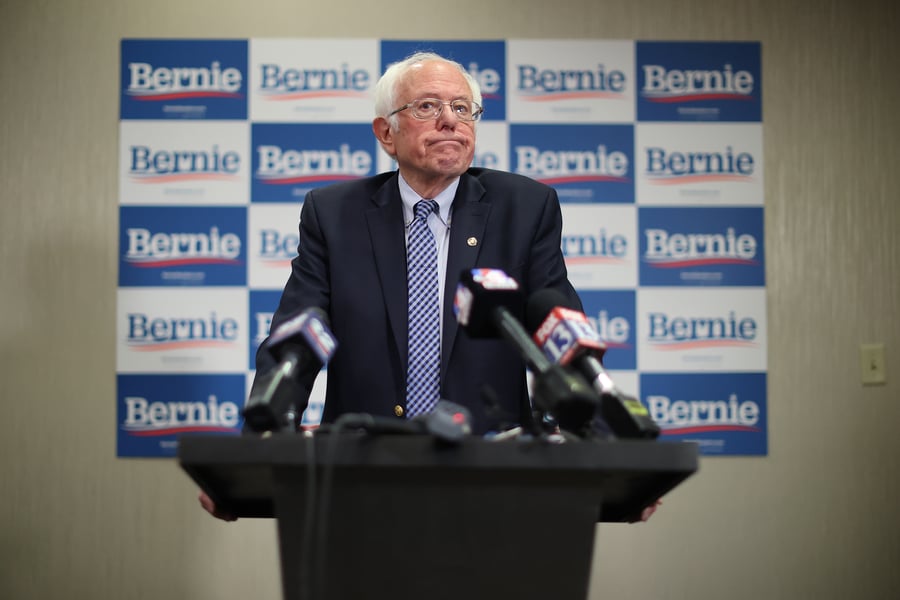Sen. Bernie Sanders has suspended his campaign for president, conceding the 2020 Democratic nomination to former Vice President Joe Biden.
Sanders announced his decision Wednesday in a livestream address to supporters saying his grassroots-supported run — conducted under the banner of “Not me, us” — had changed the country for the better, demonstrated the progressive movement’s power, and proved it was possible to run a campaign “that is not dependent on the wealthy and the powerful.” He declared he and his supporters had “won the contest of ideas,” but his ebullience faded when he discussed the state of the race.
“I wish I could give you better news, but I think you know the truth. We are now some 300 delegates behind Vice President Biden, and the path toward victory is virtually impossible. I have concluded that this battle for the Democratic nomination will not be successful,” Sanders said, adding that while dropping out was a “difficult and painful” decision, his focus needed to be on addressing the coronavirus pandemic and defeating Donald Trump.
“As I see the crisis gripping the nation, exacerbated by a president unwilling or unable to provide leadership, I cannot in good conscience continue to run a campaign that cannot win,” he said.
Sanders congratulated Biden, whom he called “a very decent man,” and pledged to work with him in his upcoming contest against Trump, saying the two would emerge united from the primary and defeat “the most dangerous president in modern history.”
Sanders also said he would remain on the ballot in the remaining primary states and continue to accrue delegates, saying he would use them to push the party’s convention platform to include progressive policies and goals.
“We have never been just a campaign. We are a grassroots, multiracial multigenerational movement,” Sanders said. “While this campaign is coming to an end, our movement is not. The fight for justice is what our campaign has been about. It’s what our movement remains about.”
Love Music?
Get your daily dose of everything happening in Australian/New Zealand music and globally.
Sanders’ official exit from the race cements what has been clear for weeks: He had fallen too far behind Biden in the delegate race to catch up, and the former vice president continued to put distance between his progressive rival. Still, the announcement represented a turnaround for the candidate who, less than six weeks ago, was the favorite for the Democratic nomination.
Sanders, who remained competitive with Biden in the polls throughout the year-long primary, leapfrogged the former vice president to become the race’s early frontrunner. His spree started in Iowa, where, with the help of satellite caucuses and an assist from malfunctioning state party, he ended the night in a virtual dead heat with former South Bend mayor Pete Buttigieg. Sanders went on to notch his first outright win in New Hampshire, a neighbor to his home state of Vermont. But it was his victory in Nevada — secured with strong support from the state’s Latino community and its union households — that seemed to indicate the Democratic Socialist had a real shot of winning the 2020 primary.
Everything changed a week later in South Carolina. Joe Biden’s stunning victory in the Palmetto state helped convince a series of his former rivals — Buttigieg, Minnesota Sen. Amy Klobuchar, former Texas Rep. Beto O’Rourke — to endorse him in quick succession. And from that moment on, Biden seemed unstoppable, easily dispatching Sanders in states like Texas, and keeping his margins relatively low even in Sanders strongest states, like California.
The fact that Sanders’ campaign stalled in South Carolina, where black voters comprise 60 percent of the electorate, was not a coincidence.
Sanders improved his standing with the black electorate in 2020, but his inability to win over older black voters proved a weakness. A Late February poll showed black voters younger than 45 overwhelmingly favoring Sanders over Biden. However, Biden’s overwhelming strength with black voters overall meant the Sanders campaign was forced to play catch-up, especially in some Southern states, where Sanders lost among black voters by margins upwards of 70 percentage points.
Sanders leaves the race just as his top priority — Medicare for All — has become more urgent than ever for millions of Americans who have lost their jobs and are worried about their own health and that of their loved ones health in the midst of the coronavirus crisis.
“It was not long ago these ideas were considered radical and fringe,” Sanders said. “Today they are mainstream and many are being implemented at the state and local level. That is what we have achieved together.”
Sanders suspends his campaign having changed the Democratic party. “Our movement has won the ideological struggle,” Sanders said Wednesday, and he is right. Biden, who has spoken of the need to unite the Democratic party in order to defeat Trump, has forged a platform that shows Sanders’ impact: It includes provisions to expand healthcare to cover up to 80 percent of the population via a public option, to achieve net-zero carbon emissions by 2050 to address climate change, and to make community colleges tuition-free.
Sanders’ exit from the race Wednesday stands in contrast to his insistence four years ago to remain in the race until the end of voting. He campaigned for Hillary Clinton after the campaign and urged his supporters to vote for her, but there’s lingering resentment among some Democrats — including from Clinton herself — who say Sanders damaged her prospects against Trump by refusing to concede.
On Wednesday, Sanders said he felt an obligation to devote his full attention to addressing the coronavirus outbreak through his role in the Senate.



































